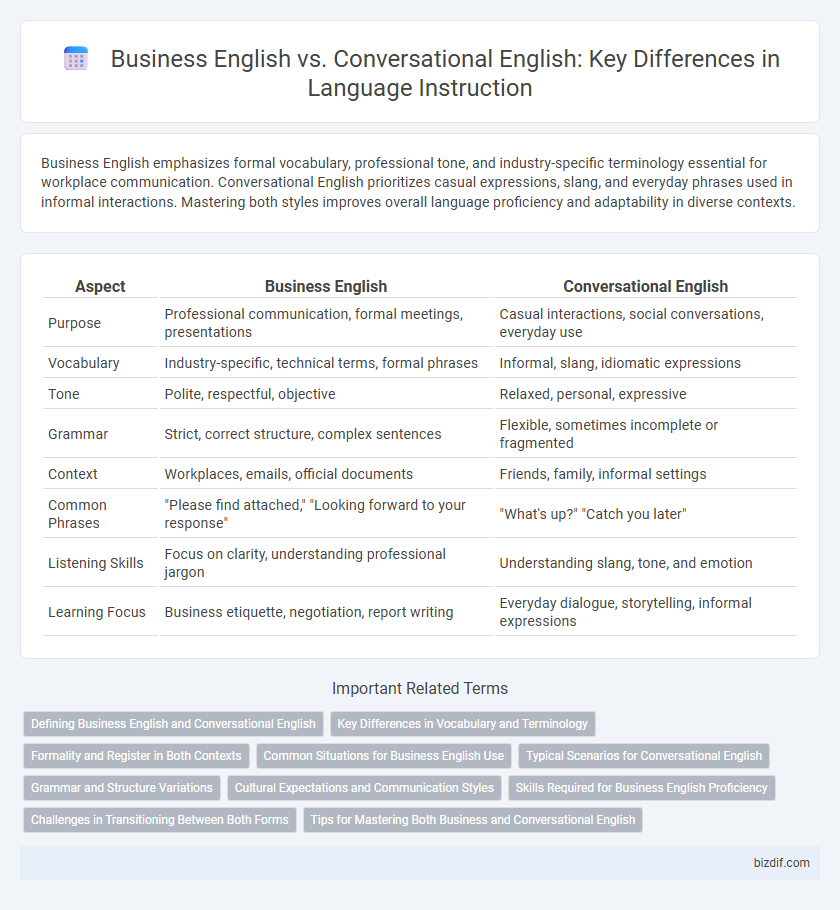Business English emphasizes formal vocabulary, professional tone, and industry-specific terminology essential for workplace communication. Conversational English prioritizes casual expressions, slang, and everyday phrases used in informal interactions. Mastering both styles improves overall language proficiency and adaptability in diverse contexts.
Table of Comparison
| Aspect | Business English | Conversational English |
|---|---|---|
| Purpose | Professional communication, formal meetings, presentations | Casual interactions, social conversations, everyday use |
| Vocabulary | Industry-specific, technical terms, formal phrases | Informal, slang, idiomatic expressions |
| Tone | Polite, respectful, objective | Relaxed, personal, expressive |
| Grammar | Strict, correct structure, complex sentences | Flexible, sometimes incomplete or fragmented |
| Context | Workplaces, emails, official documents | Friends, family, informal settings |
| Common Phrases | "Please find attached," "Looking forward to your response" | "What's up?" "Catch you later" |
| Listening Skills | Focus on clarity, understanding professional jargon | Understanding slang, tone, and emotion |
| Learning Focus | Business etiquette, negotiation, report writing | Everyday dialogue, storytelling, informal expressions |
Defining Business English and Conversational English
Business English centers on formal communication skills essential for professional settings, including writing emails, giving presentations, and negotiating deals. Conversational English emphasizes everyday language used for informal interactions, socializing, and casual conversations. Mastery of Business English enhances workplace efficiency, while conversational English facilitates social integration and personal connections.
Key Differences in Vocabulary and Terminology
Business English employs specialized vocabulary and terminology related to finance, management, marketing, and industry-specific jargon, which is essential for professional communication and clarity in transactions. Conversational English uses everyday vocabulary and informal expressions tailored for casual interactions and social settings. Mastery of business-specific terms like "ROI," "benchmarking," and "stakeholders" distinguishes it from conversational English focused on idiomatic phrases and slang.
Formality and Register in Both Contexts
Business English emphasizes formal vocabulary, precise phrasing, and structured sentences to maintain professionalism and clarity in workplace communication. Conversational English favors informal expressions, idiomatic phrases, and relaxed syntax to promote natural and spontaneous interactions. Understanding the appropriate register and level of formality in each context enhances effective communication and cultural competence.
Common Situations for Business English Use
Business English is essential for common professional situations such as meetings, presentations, negotiations, and email correspondence, where formal tone and specialized vocabulary are required. Unlike conversational English, which emphasizes casual dialogue and everyday expressions, Business English focuses on clarity, precision, and industry-specific terminology to enhance workplace communication. Mastery of business-related phrases and etiquette improves effectiveness in client interactions, report writing, and corporate networking events.
Typical Scenarios for Conversational English
Typical scenarios for conversational English include casual social interactions, everyday errands, small talk with acquaintances, and informal discussions among friends or family. These situations often involve idiomatic expressions, slang, and a relaxed tone, facilitating natural and spontaneous communication. Mastery of conversational English enhances interpersonal relationships and cultural understanding in daily life.
Grammar and Structure Variations
Business English emphasizes precise grammar and formal structure, using complete sentences with correct tense and subject-verb agreement to convey professionalism. Conversational English often features relaxed grammar rules, including fragment sentences, contractions, and colloquialisms tailored for informal, spontaneous communication. Mastery of business grammar structures ensures clarity in corporate communication, while understanding conversational variations aids in everyday social interactions.
Cultural Expectations and Communication Styles
Business English emphasizes formal vocabulary, clear structure, and professionalism to meet corporate cultural expectations, whereas conversational English often relies on informal expressions, slang, and a relaxed tone. Communication styles in Business English prioritize clarity, politeness, and protocol to foster effective workplace interactions, while conversational English values spontaneity and emotional expression suited for personal or casual settings. Understanding these differences is crucial for language learners to navigate diverse social and professional environments successfully.
Skills Required for Business English Proficiency
Mastering Business English proficiency requires advanced skills in formal writing, professional vocabulary, and precise communication tailored to corporate settings. Effective business communication involves understanding industry-specific jargon, negotiation techniques, and presentation skills that differ significantly from casual conversational English. Strong command of grammar, email etiquette, and cross-cultural communication also plays a crucial role in mastering Business English for global professional environments.
Challenges in Transitioning Between Both Forms
Transitioning from conversational English to Business English involves mastering specialized vocabulary, formal tone, and industry-specific jargon that are often absent in everyday speech. Learners may struggle with adapting to concise, objective communication styles required in business contexts, which contrasts with the relaxed and idiomatic expressions common in casual conversations. Developing proficiency requires focused practice on context-driven language use, including understanding cultural nuances and professional etiquette.
Tips for Mastering Both Business and Conversational English
Mastering Business English requires focusing on industry-specific vocabulary, formal tone, and clear, concise communication tailored for professional settings like meetings and presentations. Conversational English emphasizes everyday expressions, idiomatic phrases, and casual tone to build rapport and ease social interactions. Practice through role-playing business scenarios and informal discussions enhances fluency and confidence in both language styles.
Business English vs conversational English Infographic

 bizdif.com
bizdif.com